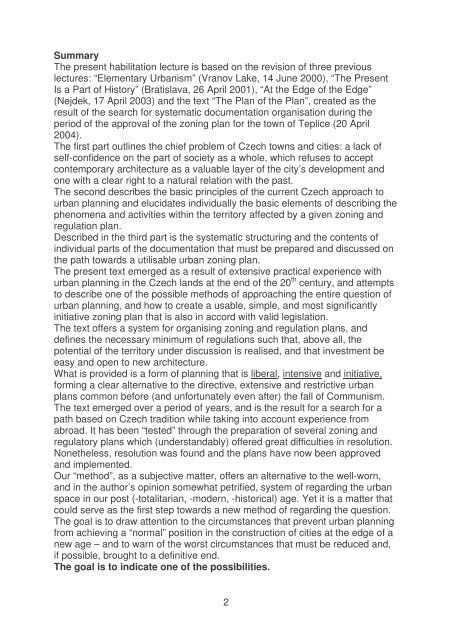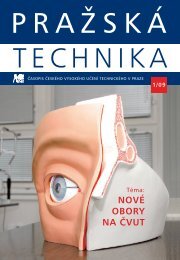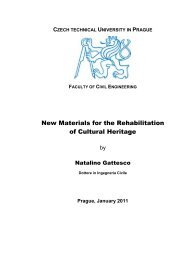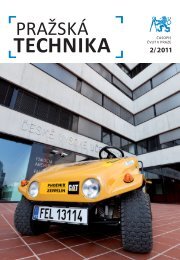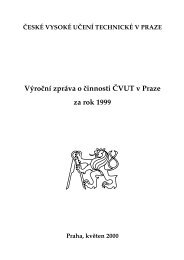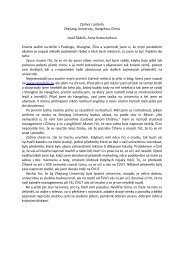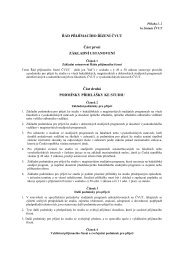Ing.arch. Roman Koucký elementární.urbanismus elemnary.urbanism
Ing.arch. Roman Koucký elementární.urbanismus elemnary.urbanism
Ing.arch. Roman Koucký elementární.urbanismus elemnary.urbanism
You also want an ePaper? Increase the reach of your titles
YUMPU automatically turns print PDFs into web optimized ePapers that Google loves.
Summary<br />
The present habilitation lecture is based on the revision of three previous<br />
lectures: “Elementary Urbanism” (Vranov Lake, 14 June 2000), “The Present<br />
Is a Part of History” (Bratislava, 26 April 2001), “At the Edge of the Edge”<br />
(Nejdek, 17 April 2003) and the text “The Plan of the Plan”, created as the<br />
result of the se<strong>arch</strong> for systematic documentation organisation during the<br />
period of the approval of the zoning plan for the town of Teplice (20 April<br />
2004).<br />
The first part outlines the chief problem of Czech towns and cities: a lack of<br />
self-confidence on the part of society as a whole, which refuses to accept<br />
contemporary <strong>arch</strong>itecture as a valuable layer of the city’s development and<br />
one with a clear right to a natural relation with the past.<br />
The second describes the basic principles of the current Czech approach to<br />
urban planning and elucidates individually the basic elements of describing the<br />
phenomena and activities within the territory affected by a given zoning and<br />
regulation plan.<br />
Described in the third part is the systematic structuring and the contents of<br />
individual parts of the documentation that must be prepared and discussed on<br />
the path towards a utilisable urban zoning plan.<br />
The present text emerged as a result of extensive practical experience with<br />
urban planning in the Czech lands at the end of the 20 th century, and attempts<br />
to describe one of the possible methods of approaching the entire question of<br />
urban planning, and how to create a usable, simple, and most significantly<br />
initiative zoning plan that is also in accord with valid legislation.<br />
The text offers a system for organising zoning and regulation plans, and<br />
defines the necessary minimum of regulations such that, above all, the<br />
potential of the territory under discussion is realised, and that investment be<br />
easy and open to new <strong>arch</strong>itecture.<br />
What is provided is a form of planning that is liberal, intensive and initiative,<br />
forming a clear alternative to the directive, extensive and restrictive urban<br />
plans common before (and unfortunately even after) the fall of Communism.<br />
The text emerged over a period of years, and is the result for a se<strong>arch</strong> for a<br />
path based on Czech tradition while taking into account experience from<br />
abroad. It has been “tested” through the preparation of several zoning and<br />
regulatory plans which (understandably) offered great difficulties in resolution.<br />
Nonetheless, resolution was found and the plans have now been approved<br />
and implemented.<br />
Our “method”, as a subjective matter, offers an alternative to the well-worn,<br />
and in the author’s opinion somewhat petrified, system of regarding the urban<br />
space in our post (-totalitarian, -modern, -historical) age. Yet it is a matter that<br />
could serve as the first step towards a new method of regarding the question.<br />
The goal is to draw attention to the circumstances that prevent urban planning<br />
from achieving a “normal” position in the construction of cities at the edge of a<br />
new age – and to warn of the worst circumstances that must be reduced and,<br />
if possible, brought to a definitive end.<br />
The goal is to indicate one of the possibilities.<br />
2


